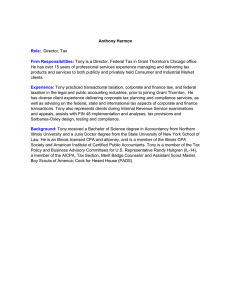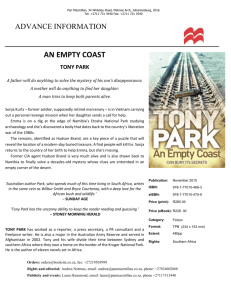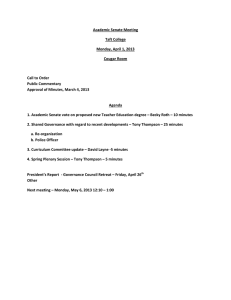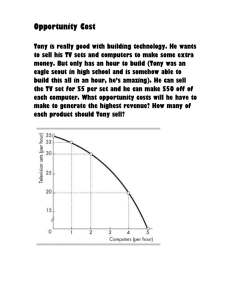Visit by American Poet and Translator, Tony Barnstone (in March...
advertisement
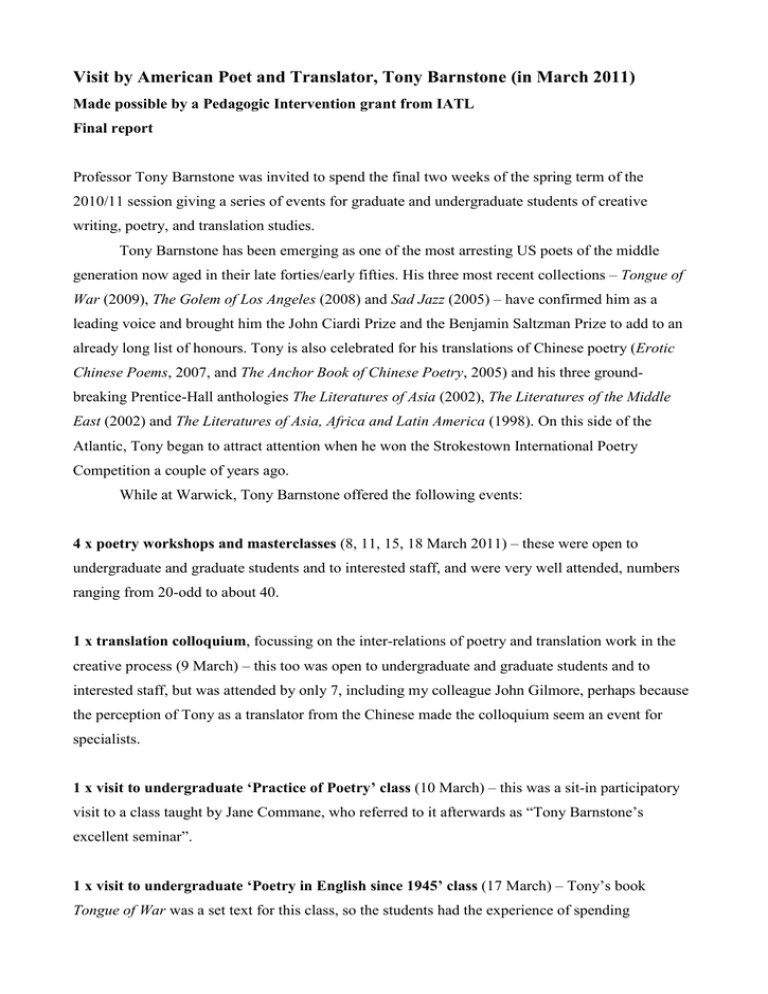
Visit by American Poet and Translator, Tony Barnstone (in March 2011) Made possible by a Pedagogic Intervention grant from IATL Final report Professor Tony Barnstone was invited to spend the final two weeks of the spring term of the 2010/11 session giving a series of events for graduate and undergraduate students of creative writing, poetry, and translation studies. Tony Barnstone has been emerging as one of the most arresting US poets of the middle generation now aged in their late forties/early fifties. His three most recent collections – Tongue of War (2009), The Golem of Los Angeles (2008) and Sad Jazz (2005) – have confirmed him as a leading voice and brought him the John Ciardi Prize and the Benjamin Saltzman Prize to add to an already long list of honours. Tony is also celebrated for his translations of Chinese poetry (Erotic Chinese Poems, 2007, and The Anchor Book of Chinese Poetry, 2005) and his three groundbreaking Prentice-Hall anthologies The Literatures of Asia (2002), The Literatures of the Middle East (2002) and The Literatures of Asia, Africa and Latin America (1998). On this side of the Atlantic, Tony began to attract attention when he won the Strokestown International Poetry Competition a couple of years ago. While at Warwick, Tony Barnstone offered the following events: 4 x poetry workshops and masterclasses (8, 11, 15, 18 March 2011) – these were open to undergraduate and graduate students and to interested staff, and were very well attended, numbers ranging from 20-odd to about 40. 1 x translation colloquium, focussing on the inter-relations of poetry and translation work in the creative process (9 March) – this too was open to undergraduate and graduate students and to interested staff, but was attended by only 7, including my colleague John Gilmore, perhaps because the perception of Tony as a translator from the Chinese made the colloquium seem an event for specialists. 1 x visit to undergraduate ‘Practice of Poetry’ class (10 March) – this was a sit-in participatory visit to a class taught by Jane Commane, who referred to it afterwards as “Tony Barnstone’s excellent seminar”. 1 x visit to undergraduate ‘Poetry in English since 1945’ class (17 March) – Tony’s book Tongue of War was a set text for this class, so the students had the experience of spending discussion time with the author. 1 x poetry reading (18 March) – this was attended by over 40. Additionally, Tony Barnstone offered informal one-to-one craft conversations in the Café Humanities, for any students who wanted specific help with ongoing writing projects. This generous offer was taken up by several students. He also met interested members of staff informally. On 21 March 2011, when Tony Barnstone had left, I emailed the following message to those who had been at his events, asking for any feedback: Thank you very much indeed for supporting Tony’s visit to Warwick. He enjoyed working with you very much indeed, and behind your backs had nothing but praise for you and your work. I wonder if I might ask you all to do me a small favour. Since the residency was paid for with university funds, I’ll need to write a report, and it would be very good to have some comments to include in it. Could you perhaps send me a sentence or so saying what your impression of the events (workshops, reading, translation colloquium, class visits – any or all) and of Tony was, and whether you feel your experience of his residency has been of benefit to you? These are the responses I received, from undergraduate and graduate students and a staff member: I found Tony’s workshop's hugely helpful for my own writing as well as being fun and interesting. By looking at student poems it was really useful to see what mistakes writers often make, and it taught me a new way to look back on a poem already written. Tony was inspiring and this was a really great opportunity. Rebecca McMillan, 25 March 2011 The entire experience was great. It was particularly good to have someone who specialises in Chinese literature, as I don’t think we have this in the department. This helped my PWP directly and I’m currently following his recommendations up. The translation colloquium was extremely useful – really nice to question someone who is both a poet and a translator. Tony himself was extremely encouraging, cheerful and his feedback was very sharp. Annabella Massey, 23 March 2011 Tony was approachable and helpful; his workshops were great and the feedback he provided was constructive and acute. The discussions were always useful and well-guided, and Tony was able both to give critique and introduce numerous different approaches to poetry which I found enlightening both as a reader and a writer. David Greaves, 22 March 2011 I found Tony Barnstone’s workshops and reading made a great difference to my understanding of the crafting process. As a more experienced poet than the other students, I perhaps got something rather different out of them. I have struggled for years with the choice, to amuse or be serious. Tony showed me that it is possible to be both in the same poem. Beyond that, he was always pushing for the exceptional, a lesson that all poets need reminding of from time to time. Finally, he is an inspirational teacher and the atmosphere in the workshops was perfect: inclusive, gentle and demanding. Don Barnard, 22 March 2011 I really enjoyed having Tony teaching in our Poetry in English since 1945 seminar, and thought it was great to be able to get comments on his own work directly from a (living) poet. It was also interesting hearing a couple of the songs that have arisen out of Tongue of War, as that provoked a discussion on how the sequence that adapts from such a variety of sources and historical accounts is now itself being subject to the process of adaptation into song lyrics. Ian Chung, 21 March 2011 Tony fully participated in university life, with an array of scheduled class visits, extra-curricular sessions and one-to-one tutorials. All the students I spoke to expressed how valuable his feedback was, constructive and insightful. I personally found his sessions very engaging and a great enrichment to our undergraduate and postgraduate programmes in creative writing. His detailed workshop on his redrafting process was of particular interest, demonstrating confidence and a great array of techniques for preparing longer projects, such as his book length sequences, as well as how to tackle individual poems. Students who attended are now very well-equipped for preparing their portfolios for assessment in May. This kind of professional visit is absolutely integral to the Writing Programme’s mission statement and such a brilliant experience boosts our profile internationally. We need more visits of this calibre, perhaps even a regularly funded opportunity for international writers-in-residence. George Ttoouli, 21 March 2011 I found Tony to be astoundingly helpful and friendly during the times that I saw him. His insights into translation were fascinating, and his dedication to meeting the needs of the students was impressive – despite being ill, he still found time to give individual advice to whoever asked for it, and discuss whatever creative writing project they were working on. In the few days he was here I feel I have benefitted enormously, and hope that more great speakers and writers will be able to visit Warwick in the future. Sean Hudson, 21 March 2011 I could only make the workshop on ‘funny poems’ but I found it very informative. It was a good session, with interesting analyses of poems that Tony distributed and also poems written by the group. Tony provided good insight into composing a poem containing humour. I personally found that a lot of the things he pointed out made total sense: he made me scratch my head and think ‘why did I not consider this before?’ His energy is infectious and the workshop flew by. Lee Dakin, 21 March 2011 I really enjoyed Tony’s visit. I love reading poetry, but have never felt comfortable writing poetry. I made my first serious attempt for these workshops, and Tony’s feedback (during that informal session in the Humanities coffee shop) was extremely helpful. I found the discussions on image, humor, and form particularly useful. These activities have encouraged me to keep writing poetry, even if I may not be happy with my initial attempts. Thank you for putting this all together. It was a wonderful experience. Maria Atienza, 21 March 2011 Tony is a very generous and experienced critic, and I thoroughly enjoyed and benefited from his visit. Alexander Freer, 21 March 2011 Michael Hulse
